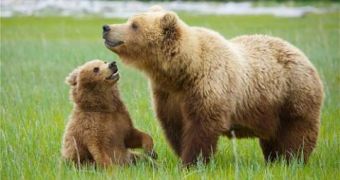They don't know it yet, but grizzly bears in the Yellowstone National Park in the state of Wyoming in the United States could soon be left without the legal protection that the country's high officials were kind enough to bestow upon them back in 1975.
Thus, Nature tells us that, at the advice of a government advisory panel of wildlife officials, the Fish and Wildlife Service in the United States is considering lifting the legal safeguards currently protecting this species.
The same source details that, back in 1975, just 136 grizzly bears were left in the Yellowstone National Park.
By the looks of it, their overall headcount dropped to such an extent due to repeated run-ins with ranchers, hunters, and park visitors that more often than not ended with the grizzlies losing.
Thanks to the legal protection the bears came to benefit from under the Endangered Species Act, their population has considerably increased over the past years.
More precisely, conservationists and wildlife researchers estimate that over 700 animals belonging to this species currently inhabit said region.
Apparently, the government advisory panel of wildlife officials thinks that there are enough grizzly bears in the Yellowstone National Park for the species to no longer need legal safeguards.
Conservationists disagree, and say that, despite this boom in the region's grizzly population, the species still runs the risk of going extinct, chiefly because climate change is toying with its food sources.
“As the Yellowstone region has warmed, mountain pine beetles and blister rust fungus – once thwarted by the cold, dry climate – have devastated the trees, depriving grizzlies of energy-rich pine nuts.”
“Moreover, say conservationists, invasive fish have crowded out native cutthroat trout in Yellowstone Lake at the heart of the park, reducing another important food source for the bears,” Nature details.
Hence, grizzly bears living in this part of the United States need all the help they can get in order to survive on the long run, environmentalists stress.
Despite these warnings, there are some who say that grizzlies are doing just fine, and that they have figured out a way to deal with the new environment they live in. Specifically, they have switched to eating more elk and bison.
Then again, their doing so might foster conflicts with humans, either because the bears will end up competing with hunters or become they will start attacking livestock.
In time, this could lead to another drop in Yellowstone's grizzly population.
Lastly, conservationists argue that there are fewer bears in the National Park than the government thinks, which is why the species must not be left without its protected status.
The Fish and Wildlife Service is expected to announce whether or not grizzly bears are to lose legal protection sometime this coming spring. Conservationists say that, if they are not happy with the Service's decision, they will surely sue.

 14 DAY TRIAL //
14 DAY TRIAL //